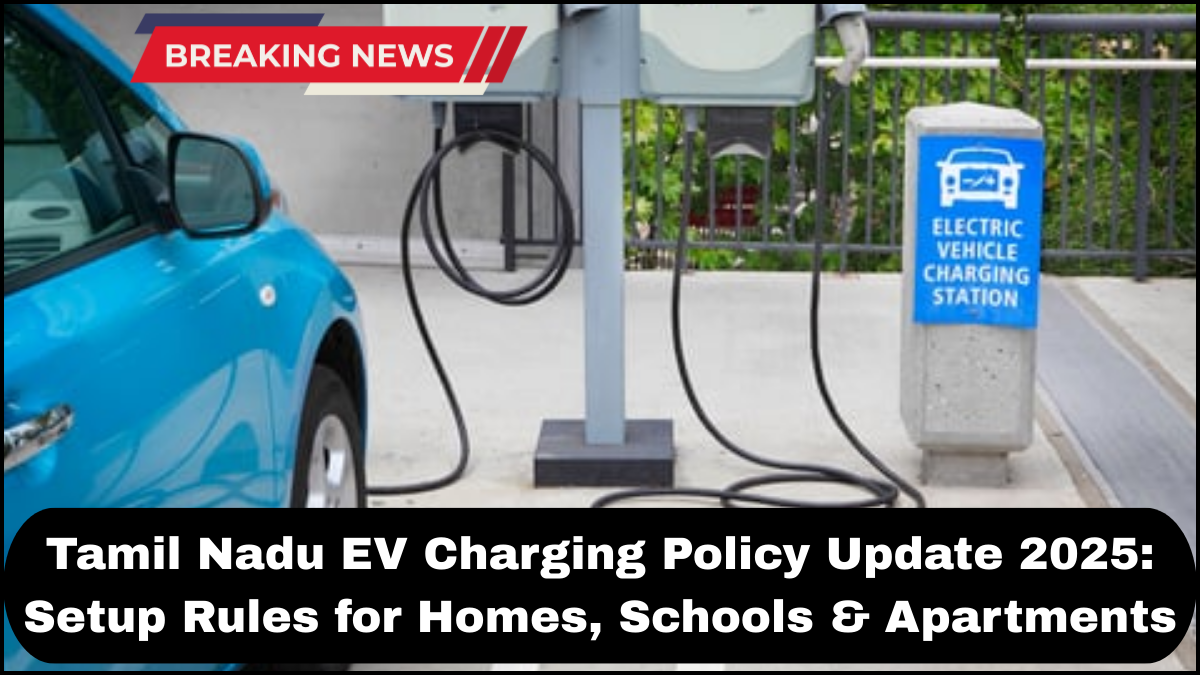The EV Charging Policy Update Tamil Nadu 2025 marks a significant step toward accelerating the state’s transition to electric mobility. In a bid to support the growing demand for electric vehicles (EVs), Tamil Nadu has revised its infrastructure strategy, placing a strong emphasis on decentralized charging facilities—particularly at homes, educational institutions, and residential complexes. This policy aims to remove key barriers to EV adoption and set a national benchmark for state-level EV infrastructure planning.

Why the 2025 Policy Matters
With EV ownership surging across Tamil Nadu, especially in urban centers like Chennai, Coimbatore, and Madurai, the absence of accessible and reliable charging infrastructure remains a top concern. The 2025 update directly addresses this by introducing specific electric station setup rules in Tamil Nadu for individual residences, apartment complexes, and public institutions like schools.
This policy update also aligns with India’s broader target to achieve 30% electric vehicle penetration by 2030. By empowering households and community spaces to set up chargers, Tamil Nadu is preparing for the infrastructure surge that will accompany higher EV adoption.
EV Charging at Residential Homes
Under the new policy, individual homeowners are now encouraged and supported to install private charging units. Here are the updated rules and recommendations:
-
Pre-Approved Load Capacity: Households must ensure their electricity connection can support an additional 3.3 to 7.4 kW load, which is standard for Level 1 and Level 2 chargers.
-
Fast-Track Permissions: Tamil Nadu Generation and Distribution Corporation (TANGEDCO) is required to process domestic EV charging installation requests within 7 working days.
-
Subsidies and Incentives: Homeowners can claim installation subsidies under state or central EV schemes, which may reduce setup costs by up to 30%.
-
Smart Metering: Mandatory integration with smart meters ensures grid safety and enables dynamic energy pricing for EV users.
Apartment Complexes & Gated Communities
The EV Charging Policy Update Tamil Nadu 2025 introduces compulsory guidelines for new and existing apartment buildings:
-
Mandatory EV-Ready Infrastructure: New residential developments must allocate at least 20% of parking space for EV charging stations.
-
Retrofitting Old Buildings: Older apartments can now access state grants to retrofit their existing electrical systems to support communal charging hubs.
-
Load Management Plans: Developers and housing associations must coordinate with TANGEDCO to implement load-sharing mechanisms and avoid grid overloads.
-
Dedicated Billing Mechanism: Separate billing for EV consumption is now mandatory to ensure fair electricity sharing among residents.
Charging Stations in Schools and Educational Institutions
An important inclusion in the 2025 policy is the integration of charging stations within school and college campuses:
-
At Least One Charging Point: All government and private schools with a student strength over 1,000 must install at least one EV charging unit by 2026.
-
Staff and Visitor Access: These stations must be accessible not just to school vehicles but also to faculty and visitors during off-peak hours.
-
Dual Use with Solar Power: Institutions are encouraged to integrate solar-based charging systems to offset electricity costs and promote sustainable energy use.
Streamlined Approval & Licensing
The state has introduced a single-window clearance system for all EV charging setups. Whether you’re a homeowner, builder, or educational institution, you’ll now go through one platform for:
-
Licensing and safety inspections
-
Electricity connection upgrades
-
Subsidy applications
-
Vendor and equipment approvals
The state government also published a list of certified EV charger providers to simplify procurement.
Private Sector & PPP Models Encouraged
While the focus is on enabling charging at the micro level, Tamil Nadu also invites private players to partner under a Public-Private Partnership (PPP) model to install charging units in public places, transport hubs, and along highways.
This decentralized plus commercial approach ensures robust network expansion while keeping residential and institutional needs front and center.
Final Thoughts
The EV Charging Policy Update Tamil Nadu 2025 is more than a regulation—it’s a framework designed to future-proof the state’s mobility infrastructure. By including targeted provisions for homes, apartment complexes, and schools, the government is removing one of the biggest obstacles to EV adoption: lack of convenient charging. This shift ensures EV ownership becomes feasible and sustainable for all sections of society.
FAQs
1. Can individual homeowners install EV chargers without building approval?
Yes. Homeowners with independent power connections can install chargers without additional building permissions, provided they meet TANGEDCO’s technical requirements.
2. Are there penalties for apartments that do not comply?
For new residential projects, EV-readiness is mandatory and part of the building code. Non-compliance could result in approval delays or denial of occupancy certificates.
3. Can schools access government funds for charging stations?
Yes. Government and aided schools can apply for state-level green infrastructure grants, which partially cover EV charger costs.
4. What type of EV chargers are approved under the policy?
Level 1 and Level 2 chargers (AC) are recommended for home and institutional use. Level 3 (DC fast chargers) are advised for public charging networks and high-traffic zones.
5. How does the single-window clearance help?
It simplifies the setup process by combining all regulatory steps—like safety checks, grid upgrades, and subsidy disbursements—into one platform, reducing red tape.
click here to learn more